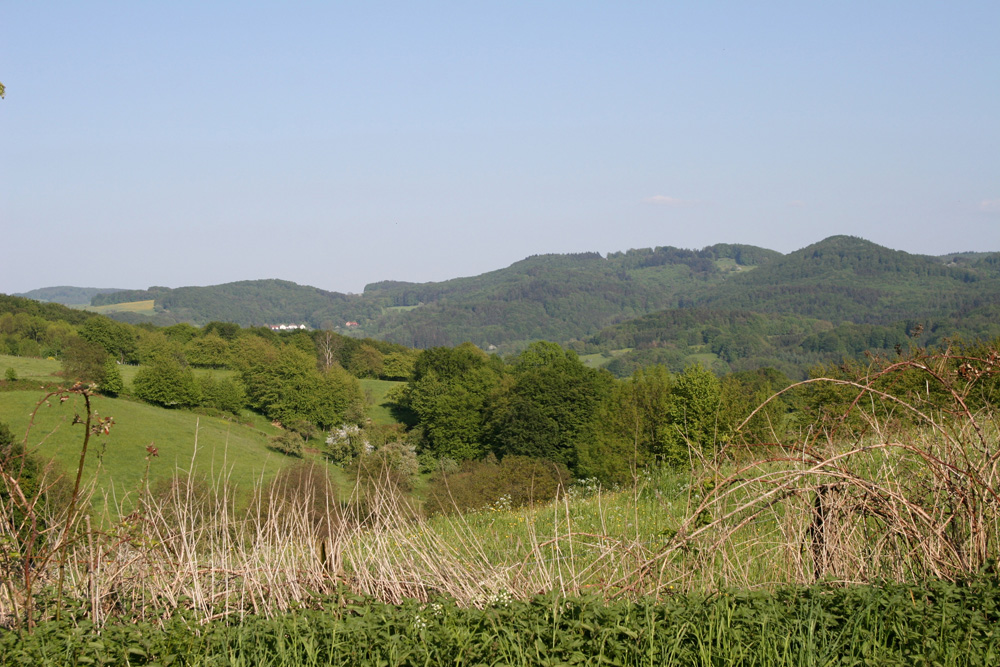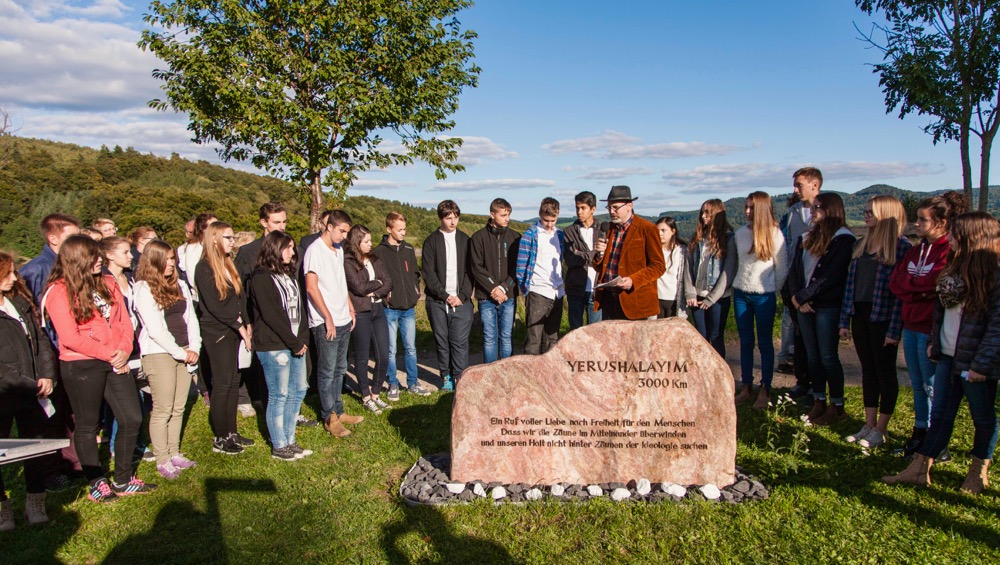Chapter: Project / Society
Society and Responsibility
Introduction
The Friedensmal extends not only the German culture of remembrance but also broadens the global perspective on the themes of “inner liberation” and personal transformation. It bridges the sorrowful yet hopeful history of humanity and emphasizes the spiritual dimension of peace. In doing so, it shifts the focus from pain and death to a focus on life that we can shape with love.
The Friedensmal fosters self-encounter and dialogue to heal emotional and societal wounds. It highlights the universal importance of relationship and reconciliation; for peace must become concrete in all cultures and communities. It serves as a place of learning for people of diverse backgrounds to understand the significance of memory, encounter, and reconciliation.
In a time when freedom of speech - specifically again in Germany - is threatened and the past is often instrumentalized for political purposes, the Friedensmal serves as a reminder to preserve freedom of speech and emphasizes individual responsibility for freedom and justice. It addresses societal divisions and, as an artistic expression for life and freedom, offers new perspectives.
Located in the Garden of Freedom, the Friedensmal encourages standing up for freedom, justice, and life. It is a place of encounter and healing, inviting people worldwide to overcome fear and stand up for freedom, justice, and life. It forms a bridge in a divided world and carries profound social and cultural significance.
In this context, it is particularly important to be vigilant. The instrumentalization of the past can create a climate of fear and uncertainty that threatens individual and collective freedom. It is about inner liberation from totalitarian mindsets that operated in the past and still influence today. This is a call to responsibility, inner transformation, and reconciliation across boundaries.
Do not forget Jerusalem (Psalm 137)
Culture of Remembrance
The Friedensmal, in awareness of past suffering, shows a path of healing and new life. Without elements like light, life, and hope, a totalitarian spirit that binds us to the past and can foster its repetition in another form cannot be overcome. While the memorials of German culture of remembrance play an important role in dealing with past suffering, they also touch on feelings of guilt and shame and often do not offer a direct solution to overcome the ideologies they warn against, both on a collective and personal level. True integration and "learning from the past" - in the sense of liberation from this ideology - are therefore often not yet achieved.From this realization, the motivation arose to build this Friedensmal as an 'Idea of Jerusalem'; it evolved as a private project over many years of volunteer work. It should not be seen as a contrast to the existing culture of remembrance, but as its natural continuation, emphasizing the possibility of "inner liberation." As Heraclitus said, "Everything flows." Life is a constant process, and this insight is valid all over the world.
Inner Liberation
The coming to terms with the past can achieve a deeper meaning worldwide if it encounters people positively and focuses on human dignity instead of primarily arousing feelings of guilt and shame that can lead to powerlessness. The "lesson from the past" should be perceived as a change in the heart. "Learning from the past" means much more than just the state-ordained "fighting of evil." It is about empowering people to recognize evil, even if it disguises itself as good and seems to be accepted by the majority.What is needed for real change is personal insight and inner transformation. Every person carries both good and evil within them. Evil will never be completely eradicated; however, we can learn to deal with it in such a way that it does not dominate us and our decisions are free from it. It's about inner liberation from totalitarian mindsets that operated in the past and still have influence today, and this applies not only to Germany but to societies worldwide.
Spiritual Dimension
The
Friedensmal reminds us with the 'Stone of Encounter' and its inscription 'Yerushalayim' (Jerusalem) of the importance of peace in the name of Jerusalem, the "Site of Peace." It serves as an encouragement to bring light into a world that too often focuses on death and reduces human existence to the functionality of a machine. Turning towards life is particularly important in Germany with its historical past, where the life of "Jerusalem" was denied. The name 'Jerusalem,' with its reference to the heavenly Jerusalem and the Holy City, carries a high claim. Religion, with its metaphors and stories, should be understood as an inner event in one's own soul. Here, in silence and humility, the sacred happens.The choice of location for the monument underscores this universal truth. As the traditions clearly show: "He did not appear to Moses at the palace of Pharaoh, but in the countryside on the edge of the road." This place symbolizes the accessibility of the sacred away from power centers and represents the spiritual search that every person, regardless of their origin or cultural background, can undertake.

The Landscape: The View Towards the Odenwald as Seen from the Friedensmal.
Instrumentalization of the Past
Today, we are witnessing in Germany, as in other countries, that people are discredited and marginalized for their opinions. In political conflicts, the troubled past of a country, such as Germany’s, is often instrumentalized for political purposes. It is crucial to handle history sensitively and responsibly, and not to appropriate it for political ends. This is evident, for example, when individuals who criticize government measures in Germany (as in the context of the COVID-19 pandemic) are hastily and without solid evidence labeled as 'right-wing' or 'anti-Semitic'. The entire Friedensmal site was inaugurated in 2015 with a plea for freedom of speech. This cautionary
speech at the inauguration has become highly relevant just a few years later.The lessons from the past and the value of freedom of speech are universal themes that extend far beyond the borders of Germany. In many countries around the world, the danger of the instrumentalization of historical events and the restriction of freedom of speech is a pressing concern. Thus, the Friedensmal also stands as a memorial to the need for vigilance and for standing up for the freedom of the individual, independent of political and societal currents.
Freedom of Speech and Social Division
The
Friedensmal, located in the Garden of Freedom, has the potential to empower people to stand up, today and in the future, upright and courageously for freedom, justice, and life in our society. This raises the question: What does "learning from the past" mean for us? It is crucial to be vigilant and ensure that the past is not instrumentalized for political purposes. "Taking responsibility" means much more than merely following a top-down ideology of a "better world" and being praised by politics and media for it.In a time when freedom of speech is under pressure worldwide and political ideologies cause deep societal divisions, it is all the more important to have places like the Friedensmal. These serve as a reminder that real change and responsibility must come from each individual and should not be determined solely by external directives or political agendas. Thus, the Friedensmal stands as a symbol of the necessity to preserve and promote individual freedom and independent thinking, regardless of political and societal trends.
This message is universally valid and reflects the challenges faced by people worldwide. The Friedensmal reminds us that the path to a more just and free society requires the commitment and courage of every individual.
Restoration of Relationship
Living Freedom and Overcoming Fear
Even today (in 2022), many people are still bound to the spirit of unfreedom and totalitarianism. Although it is vehemently fought against today, it is only in relation to the past. We must let go of that. The
Friedensmal stands for this: Remembrance alone is not enough. - Each individual must free themselves to stand up with integrity and courage for freedom, justice, and life.Often, personal responsibility is avoided by seeking and finding 'evil' outside oneself. In German society today, it's 'the Nazis', but also alleged anti-Semites and right-wing extremists, who need to be fought against. These accusations are often made recklessly and without sufficient evidence. However, this frequently serves on a deeper psychological level as a strategy to avoid confronting one's own inner weaknesses and negative tendencies. This also occurs in the name of remembrance and responsibility and is a corrupted form of coming to terms with the past, fostering anti-Semitism and allowing history to repeat itself in a different guise.
In this context, it is particularly important to be vigilant. The instrumentalization of the past can create a climate of fear and uncertainty, threatening individual and collective freedom. The Friedensmal reminds us that true coming to terms with the past requires an honest confrontation with oneself and one's own shadow aspects, to truly stand for a freer and more just world.
Encounter and Healing
At the
Friedensmal, we find a space to reconnect with ourselves. We become aware of our own emotional injuries and the wounds of the world. Following the inward journey, we turn outward. Respecting boundaries, we open ourselves to encounters with other people and their worlds. This is addressed at the Stone of Encounter. Through inner clarification and open encounters, we as a society become capable of recognizing those ideas and behaviors that are detrimental to life, which we have, however, become accustomed to.The Friedensmal stands for the restoration of relationships. This idea needs to be filled with life and made concrete in the world. From the center of the Friedensmal, marked by the "Flower of Life," one looks into the Rhine plain, which was part of the historic Jewish "Jerusalem on the Rhine." This place thus becomes a symbol in German-Jewish history, characterized by both suffering and hope.
Leo Baeck's words after his liberation from the Theresienstadt concentration camp - "Our belief was that German and Jewish spirit could meet on German soil and become a blessing through their union" - were an expression of deep disappointment, as the Holocaust meant the destruction of this hope. Nevertheless, the Friedensmal reminds us today that from the disappointment and pain of the past arises the obligation to continue advocating for encounter, understanding, and reconciliation - in Germany and beyond.
For more information on this topic, please see the chapter "Living the Answer."

| School classes from Israel and Germany at the "Stone of Encounter" on the hiking trail with the inscription "Yerushalayim", Jerusalem. The memorial stone is located at the entrance and the border of the 'Garden of Freedom' with the Friedensmal. |
The Role of Art in Society
Art has the potential to provide society with crucial new impulses. It arises from deep inspiration and often brings new perspectives to existing systems, which they could not develop on their own. In a time when many societies around the world are characterized by division, art can be a powerful tool to build bridges and reconcile people with each other.
The Friedensmal is an example of how art can bring a pulse of life and freedom into culture – not only in Germany but as inspiration for all nations. It was inaugurated on September 27, 2015, in Bensheim, South Hesse, and represents a significant contribution to the cultural landscape. It is a place that encourages reflection and engagement with themes such as freedom, reconciliation, and humanity.
For those interested in learning more about this special artwork, a
Further link: Lecture in German on the creation of the Friedensmal
